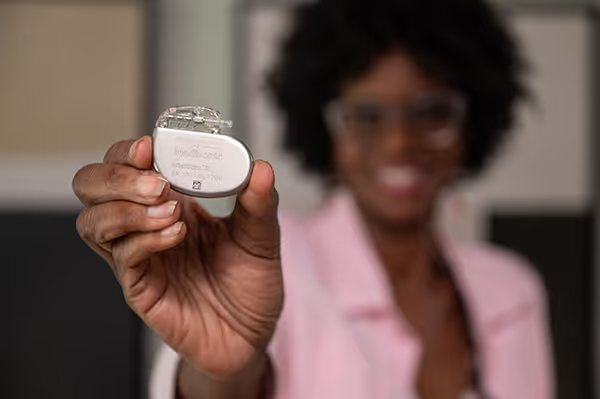Important Safety Information
Bladder control beyond pills for urinary issues including incontinence problems, urgency, and frequency.
Urology issues?
There are options.
InterStimTM FAQ: Is it right for you?
Overactive bladder affects 1 in 6 U.S. adults7,8 — but not all seek treatment.9 Learn more and feel confident about taking the next step.

What is the InterStim™ system?
The InterStim™ system is a small device, placed in the upper buttock during an outpatient procedure. It works by stimulating the nerves that help control your bladder.10,11 This may help restore§ bladder function. The InterStim™ system may reduce leaks, strong urges, and frequent trips to the bathroom1,2 — so you can get back to living on your terms.

Am I a candidate for the InterStim™ system?
If you’re still struggling with urinary bladder problems or sudden urges after trying medication, lifestyle changes, or exercises, the InterStim™ system may be a good fit.1,2 Many people just want their lives back. This system may help.

Can I try the InterStim™ system before deciding?
Yes, you can start with a short evaluation◊ — a “test drive” for your bladder. This lets you and your doctor see whether the InterStim™ system helps your symptoms before making any long-term commitment.

What can I expect from treatment?
The InterStim™ system may help reduce leaks, strong urges, and frequent trips to the bathroom1,2 — so you can get back to living on your terms. In fact, a study shows the InterStim™ system provides up to 3X better improvement in quality of life compared to medications.†,‡,5 And 84% of OAB patients say they’re satisfied with their results.6
◊ Complications can occur with test, including movement of the wire, technical problems with the device, and some temporary pain. Your healthcare provider will give you information regarding how to operate the test device, and inform you of other precautions related to the test and activity restrictions.
§ Restored function defined as a ≥ 50% reduction in dysfunctional voiding symptoms from baseline.
† Reflects overactive bladder (OAB) patients.
‡ Minimally Important Difference (MID) = 10 points.
Take the symptom quiz
See if the InterStim™ system could work for you.

What is the InterStimTM
system treatment?
- Start with an InterStim™ system evaluation.
With the InterStim™ system, you can try◊ the therapy for about a week before you decide whether to have a device implanted for long-term care.
If you and your doctor move forward, a small implant is placed in your upper buttock.
Sacral nerve stimulation modulates miscommunication between the brain and bladder/bowel to help restore§ function.10-13 - Recharge-free and rechargeable device options let you and your doctor personalize the therapy to your lifestyle.
◊ Complications can occur with test, including movement of the wire, technical problems with the device, and some temporary pain. Your healthcare provider will give you information regarding how to operate the test device, and inform you of other precautions related to the test and activity restrictions.
§ Restored function defined as a ≥ 50% reduction in dysfunctional voiding symptoms from baseline.
Information on this site should not be used as a substitute for talking with your doctor. Always talk with your doctor about diagnosis and treatment information. Not all patients will experience the same results. Risks may include surgical, device, and stimulation-related complications.
- Siegel S, Noblett K. Mangel J, et al. Five-year follow-up results of a prospective, multicenter study of patients with overactive bladder treated with sacral neuromodulation. J Urol. 2018;199(1):229-236.
- Medtronic InterStim™ Therapy Clinical Summary (2018).
- Hull T, Giese C, Wexner SD, et al. Long-term durability of sacral nerve stimulation therapy for chronic fecal incontinence. Dis Colon Rectum. 2013: 56(2):234-245.
- Cameron AP, Chung DE, Dielubanza EJ et al. The AUA/SUFU guideline on the diagnosis and treatment of idiopathic overactive bladder (2024). J Urol. 2024;212:11-20.
- Siegel S, Noblett K, Mangel J, et al. Results of a prospective, randomized, multicenter study evaluating sacral neuromodulation with InterStim™ therapy compared to standard medical therapy at 6-months in subjectswith mild symptoms of overactive bladder. Neurourol Urodyn. 2015;34:224-230.
- Foster RT Sr, Anoia EJ, Webster GD, Amundsen CL. In patients undergoing neuromodulation for intractable urge incontinence a reduction in 24-hr pad weight after the initial test stimulation best predicts long-term patient satisfaction. Neurourol Urodyn. 2007;26:213-217.
- Stewart WF, Van Rooyen JB, Cundiff GW, et al. Prevalence and burden of overactive bladder in the United States. World J Urol. 2003;20(6):327-336.
- Centers for Disease Control and Prevention (CDC). National Center for Health Statistics (NCHS). National Health and Nutrition Examination Survey Data, 2024. https://www.cdc.gov/nchs/nhanes/Default.aspx. Accessed January 31, 2025.
- Muller N. What Americans understand and how they are affected by bladder control problems: highlights of recent nationwide consumer research. Urologic Nurs. 2005;25(2):109-115.
- Chancellor MB, Chartier-Kastler EJ. Principles of sacral nerve stimulation (SNS) for the treatment of bladder and urethral sphincter dysfunctions. Neuromod. 2000;3(1):15-26.
- Leng WW, Chancellor MB. How sacral nerve stimulation neuromodulation works. Urol Clin North Am. 2005;32:11-18.
- Janssen PTJ, Komen N, Melenhorst J, et al. Sacral neuromodulation for fecal incontinence: a review of the central mechanisms of action. J Clin Gastroenterol. 2017;51(8):669-676.
- Lundby L, Moeller A, Buntzen S, et al. Relief of fecal incontinence by sacral nerve stimulation linked to focal brain activation. Dis Colon Rectum. 2011;54(3):318-323.




